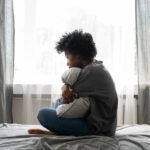Childhood sexual abuse is a pervasive issue, affecting a significant number of individuals. In Nigeria, according to UNICEF statistics, approximately one in four girls and one in ten boys experience sexual violence before the age of 18. However, these figures might underestimate the true extent of the problem, as many cases go unreported. If you suspect you have been a victim, it is essential to understand what constitutes sexual abuse.
Sexual abuse is not limited to encounters with adults; it can occur between children as well. It doesn’t always involve physical contact either. Sexual abuse can take various forms, including non-contact or covert abuse, where the victim is exposed to sexual content through actions, words, or images. Examples of covert abuse include someone constantly showing their body to you, pressuring you to expose yourself, sharing pornography, or engaging in persistent discussions about sexual topics.

Other forms of sexual abuse include verbal abuse, where sexual content is expressed or implied through spoken or written words. This can happen in social settings, workplaces, or at home. Verbal sexual abuse encompasses sexual jokes, name-calling, comments about physical attributes, explicit descriptions, unwelcome advances, sexting, and stalking through calls or messages.
Covert sexual abuse occurs when the abuser seeks sexual gratification without the victim’s knowledge. This can involve being observed, followed, photographed, or subjected to sexual cyber-harassment on social media.
Visual sexual abuse involves exposing someone to sexually explicit content without their consent. This includes unsolicited exposure to explicit photos, sexting, exhibitionism, improper dress at home, and engaging in sexual acts in front of non-consenting individuals.
Physical sexual abuse encompasses non-consensual touching, fondling, physical restraint, kissing, tickling, forced cleaning of genitals, intercourse, oral sex, and various other acts. It is important to note that consent cannot be assumed based on the absence of a clear “no” or a victim’s inability to express their refusal due to power imbalances.
Ritualistic sexual abuse combines sexual abuse with spirituality or ritual practices. Offenders may justify their behavior as acts of atonement or reverence, such as in cases of child marriage, incest rituals, genital mutilation, or incorporating chanting and incantations during abuse.
Recognising the signs of sexual abuse is crucial. It can have long-term effects on behaviour, relationships, self-perception, and physical well-being. Trauma symptoms, such as agitation, memory loss related to the abuse, heightened vigilance, emotional outbursts, and feelings of shame and guilt, may persist.

Sexual abuse can also impact relationships, leading to difficulties in forming healthy connections, trust issues, anxiety around intimacy, relationship stress, anger problems, and attraction to relationships that resemble the abusive dynamic.
Physical symptoms may manifest, including obesity, frequent minor injuries or ailments, unexplained medical issues, feeling disconnected from one’s body, mistrust of one’s body, high pain tolerance, and a constant sense of being unclean or itching.
Additionally, sexual abuse can contribute to psychiatric problems such as social anxiety, depression, anxiety disorders, sleep and eating disorders, suicidal ideation, self-harm, low self-esteem, identity crises, addictions, sexual issues, panic disorders, and even obsessive-compulsive disorder (OCD).
If you suspect you were abused as a child, it is essential to proceed with caution. Avoid confronting potential abusers immediately, as you may be vulnerable to manipulation or attack. Instead, seek counseling to process your emotions and make important decisions from a position of safety and security.
Remember, the symptoms mentioned here can also result from other traumatic childhood experiences. Seek support from trusted individuals and professionals who specialise in sexual abuse. At the Cece Yara Foundation, we offer a 24-hour toll-free helpline, 0800-800-8001, and can provide the assistance you need.
Don’t face this alone—seek help and begin your journey towards healing and recovery.






